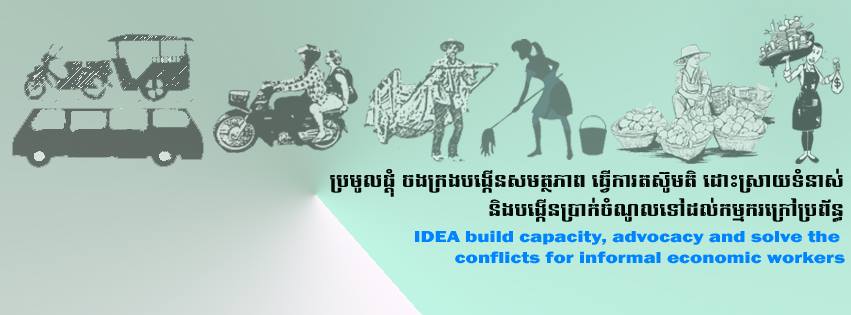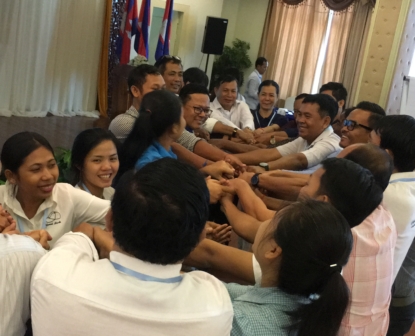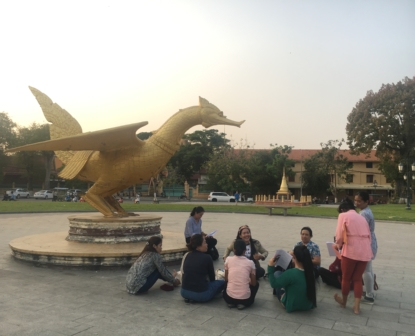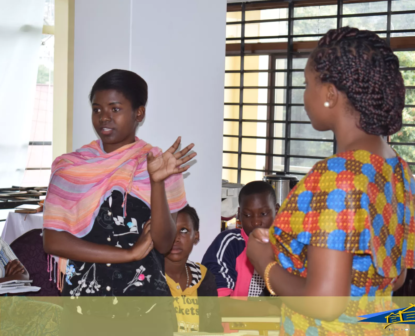Project
Improving Working Conditions & Rights of Cambodian Domestic Workers
-
Amount Funded
22,473 EUROProject Duration
01 Sep 2017 - 31 Aug 2019 -
-
Lead organisation
-
The Independent Democratic Informal Economy Association abbreviated (IDEA) is an association that was formed by motor-taxi drivers, Tuk Tuk drivers, taxi drivers, vendors, and domestic workers in 2005.
IDEA aims at enhancing the rights and freedoms of informal workers and their living standards through capacity strengthening in laws relevant to informal economy sectors. The capacity strengthening also targets occupational health and safety, peaceful demonstration, and advocacy in case of necessity. At present, the IDEA has a total of 12, 362 members including 1,752 women. Its headquarters is in Phnom Penh and has 5 provincial branches namely: Siem Reap, Banteay Meanchey, Preah Sihanouk, Battambang, and Kampot.
-
Organisation
The Independent Democratic Informal Economy Association abbreviated (IDEA) is an association that was formed by motor-taxi drivers, Tuk Tuk drivers, taxi drivers, vendors, and domestic workers in 2005.
IDEA aims at enhancing the rights and freedoms of informal workers and their living standards through capacity strengthening in laws relevant to informal economy sectors. The capacity strengthening also targets occupational health and safety, peaceful demonstration, and advocacy in case of necessity. At present, the IDEA has a total of 12, 362 members including 1,752 women. Its headquarters is in Phnom Penh and has 5 provincial branches namely: Siem Reap, Banteay Meanchey, Preah Sihanouk, Battambang, and Kampot.
-
Project
IDEA has a programme called Promoting Women Condition and Rights (PWCR) for Cambodia Women Domestic Worker. The project is strengthening 451 existing members and working with a new 200 members as Cambodian women domestic workers in Phnom Penh. IDEA organises them through direct meetings to explain the advantage of membership, to discuss on working condition, and to identify approach to get better conditions in their work place.
IDEA responses and assists members’ complaints against violation of rights including documentation of cases and networking with related NGOs. And IDEA brings cases to advocate with related government institutions. IDEA advocates with government to issues related to rules and regulations to promote and protect rights of women domestic workers. IDEA is working closely with related NGOs# networks and government#s institutions to ensure the implementation of existing rules and regulations on domestic workers.
-
-
IDEA has a programme called Promoting Women Condition and Rights (PWCR) for Cambodia Women Domestic Worker. The project is strengthening 451 existing members and working with a new 200 members as Cambodian women domestic workers in Phnom Penh. IDEA organises them through direct meetings to explain the advantage of membership, to discuss on working condition, and to identify approach to get better conditions in their work place.
IDEA responses and assists members’ complaints against violation of rights including documentation of cases and networking with related NGOs. And IDEA brings cases to advocate with related government institutions. IDEA advocates with government to issues related to rules and regulations to promote and protect rights of women domestic workers. IDEA is working closely with related NGOs# networks and government#s institutions to ensure the implementation of existing rules and regulations on domestic workers.
-
“Before I could not talk to my employer about tasks that I don’t want to do but I still do for them. Now if I don’t want then I can say no to them.” Vun Kim Srey
Vun Kim Srey is a nanny and a member of the Cambodia Domestic Worker Network (CDWN), an IDEA member union. She credits her strength from being with and learning from fellow domestic workers she meets regularly after work. Her story is just one of many similar stories of women who work in other people’s homes: cooking food, cleaning dishes, and taking care of children. It is an isolating profession with many employees working behind closed doors and working under informal agreements.
Through their Empowerment grant, IDEA reached more than 200 domestic workers to join and become new members. Outreach was done via one-on-one meetings through friends and acquaintances, explaining what it means to be a member and getting to know each of their situations. It required building a high degree of trust where everyone is in it together, finding solutions to improve their working conditions. Eventually, new members strengthened their capacity through various workshops and became advocates themselves. They joined marches during International Women’s Day and were invited to speak at a UN Women event.
Aside from sharing information, IDEA also assists members who file complaints against their employers for violating their rights. Mrs Sao Phalla, also known as Phally, endured verbal abuse from her former employer. IDEA staff documented her case and intervened on her behalf since she does not speak English. They sent him a letter laying out the complaints and asked for compensation. If the employer still refused, they would have started legal proceedings.
“IDEA will process this case following the Law of the Kingdom of Cambodia to claim justice for Mrs Phally and set an example for the sake of other domestic works. They should be treated fairly with dignity and respect like other formal workers.” Excerpt from IDEA’s letter to Mrs Phally’s employer
They advocated for domestic worker’s rights at the national level, receiving coverage from local media. Their calls have included the inclusion of informal workers in the National Security Fund and higher minimum wages for domestic workers. IDEA has continuously shown empowerment is stronger when people are together and in solidarity with one another.
-
News






